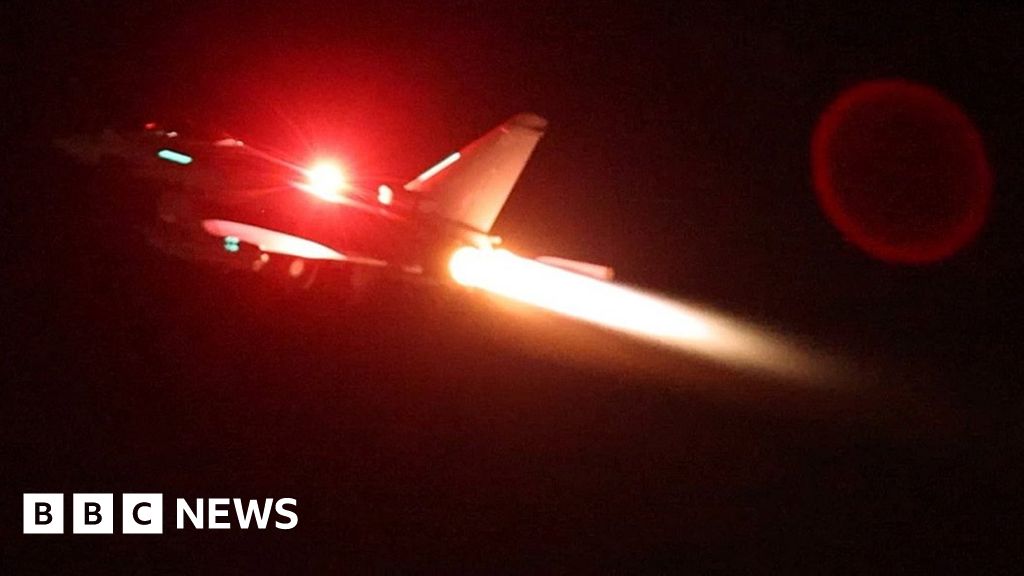- By Ruth Comerford & Frank Gardner, security correspondent
- BBC News
A handout photograph showed an RAF Typhoon taking part in the first round of joint US-UK air strikes on 11 January
The US and UK have conducted a fresh series of joint air strikes against eight Houthi targets in Yemen, the Pentagon said.
The strikes targeted an underground storage site and Houthi missile and surveillance capability, it said.
The Iran-backed Houthis have been targeting ships they say are linked to Israel and the West that travel through the important Red Sea trade route.
The US and UK said they are trying to protect the “free flow of commerce”.
A joint statement issued by the Pentagon confirmed “an additional round of proportionate and necessary strikes” against the Houthis.
It added: “Our aim remains to de-escalate tensions and restore stability in the Red Sea, but let us reiterate our warning to Houthi leadership: we will not hesitate to defend lives and the free flow of commerce in one of the world’s most critical waterways in the face of continued threats.”
This is the eighth strike by the US against Houthi targets in Yemen. It is the second joint operation with the UK, after joint strikes were carried out on 11 January.
US fighter jets from the carrier USS Eisenhower were involved in Monday’s strikes. Four RAF Typhoons, supported by a pair of Voyager tankers, joined the US forces, the UK Ministry of Defence (MoD) said.
“In line with UK standard practice, a very rigorous analysis was applied in planning the strikes to minimise any risk of civilian casualties, and as with the previous strikes, our aircraft bombed at night to mitigate yet further any such risks,” the MoD said.
Ten days after the first carefully calibrated joint air and missile strike by the US and UK, the Houthis remain defiant.
They have continued to launch a variety of projectiles at shipping passing Yemen’s coastline, in one case mistakenly targeting a ship carrying Russian oil.
Under the newly named Operation Poseidon Archer, US-led strikes have now hit fresh targets, after previously carrying out a number of pre-emptive strikes on Houthi launch sites.
These, say the Pentagon, destroyed missiles just as they were being prepared for launch. Western intelligence recently estimated that at least 30% of Houthi missile stocks had been destroyed or degraded.
Yet the Houthis, who are supplied, trained and advised by Iran, are clearly bent on continuing their attacks on shipping they suspect of being linked to Israel, the US or the UK.
These have earned them much popularity at home, where many Yemenis have been chafing under their brutal rule.
They are also popular with many across the wider Arab world since the Houthis say they are supporting Hamas as part of the Iran-backed ‘Axis of Resistance’ against Israel.
It comes after US President Joe Biden and UK Prime Minister Rishi Sunak spoke earlier on Monday.
In an official readout of their phone call, the White House said Mr Biden and Mr Sunak “discussed ongoing Iranian-backed Houthi attacks against merchant and naval vessels transiting the Red Sea”.
They reiterated “their commitment to freedom of navigation, international commerce, and defending mariners from illegal and unjustifiable attacks”, the White House said.
It added: “The president and prime minister discussed the importance of increasing humanitarian aid and civilian protections for people in Gaza, and securing the release of hostages held by Hamas.”
The Houthis began attacking merchant vessels in November, saying they were responding to Israel’s military ground operation in Gaza.
Since then, the group has launched dozens of attacks on commercial tankers passing through the Red Sea, one of the world’s busiest shipping lanes.
In response, the US and UK launched a wave of air strikes against dozens of Houthi targets on 11 January.
The strikes – supported by Australia, Bahrain, the Netherlands and Canada – began after Houthi forces ignored an ultimatum to cease attacks in the region.

Emily Foster is a globe-trotting journalist based in the UK. Her articles offer readers a global perspective on international events, exploring complex geopolitical issues and providing a nuanced view of the world’s most pressing challenges.








